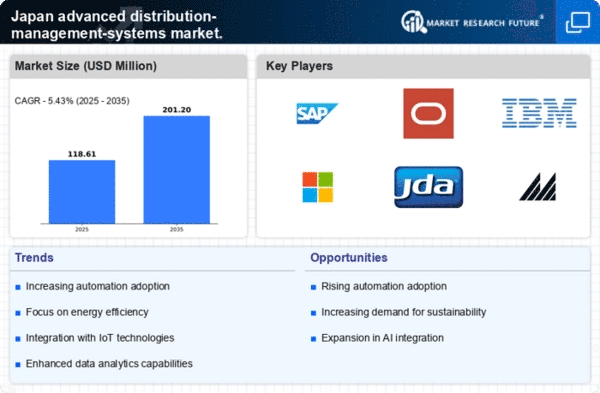Rising Demand for Automation
The advanced distribution-management-systems market in Japan is experiencing a notable surge in demand for automation solutions. This trend is driven by the need for enhanced operational efficiency and reduced labor costs. Companies are increasingly adopting automated systems to streamline their distribution processes, which can lead to a reduction in operational errors and improved service delivery. According to recent data, the automation sector in Japan is projected to grow at a CAGR of 8% over the next five years. This growth is likely to propel the advanced distribution-management-systems market, as businesses seek to integrate sophisticated technologies that facilitate seamless operations and real-time inventory management.
Government Initiatives for Smart Logistics
The Japanese government is actively promoting smart logistics initiatives, which are expected to bolster the advanced distribution-management-systems market. Through various programs and funding opportunities, the government aims to enhance the efficiency of logistics operations across the country. These initiatives include investments in technology and infrastructure that support the adoption of advanced distribution-management systems. For instance, the government has allocated ¥500 billion for logistics innovation projects, which could significantly impact the market by encouraging businesses to adopt cutting-edge solutions that improve supply chain efficiency and reduce environmental impact.
Increased Focus on Supply Chain Resilience
In the context of evolving market dynamics, the advanced distribution-management-systems market is witnessing a heightened focus on supply chain resilience. Japanese companies are increasingly recognizing the importance of robust distribution systems that can withstand disruptions and ensure continuity of operations. This awareness is leading to investments in advanced technologies that enhance flexibility and responsiveness within supply chains. As a result, the market is likely to see a shift towards systems that incorporate predictive analytics and risk management features, enabling businesses to better navigate uncertainties and maintain operational stability.
E-commerce Growth and Logistics Optimization
The rapid expansion of e-commerce in Japan is significantly influencing the advanced distribution-management-systems market. As online shopping continues to gain traction, businesses are compelled to optimize their logistics and distribution networks to meet consumer expectations for fast and reliable delivery. The e-commerce sector in Japan is expected to reach ¥20 trillion by 2025, necessitating advanced distribution solutions that can handle increased order volumes and complex supply chains. This shift is prompting companies to invest in advanced distribution-management systems that enhance visibility, tracking, and efficiency in their logistics operations, thereby driving market growth.
Technological Advancements in Data Analytics
Technological advancements in data analytics are playing a crucial role in shaping the advanced distribution-management-systems market in Japan. The ability to analyze vast amounts of data in real-time allows companies to make informed decisions regarding inventory management, demand forecasting, and distribution strategies. As businesses increasingly rely on data-driven insights, the demand for advanced distribution-management systems that integrate sophisticated analytics capabilities is expected to rise. This trend is likely to enhance operational efficiency and improve customer satisfaction, as companies can better align their distribution processes with market demands.
















